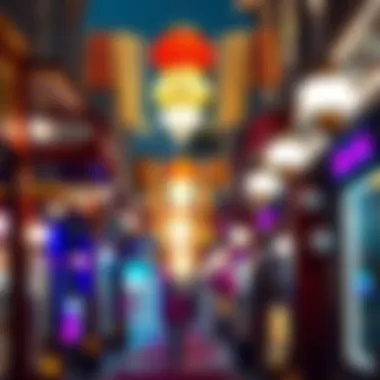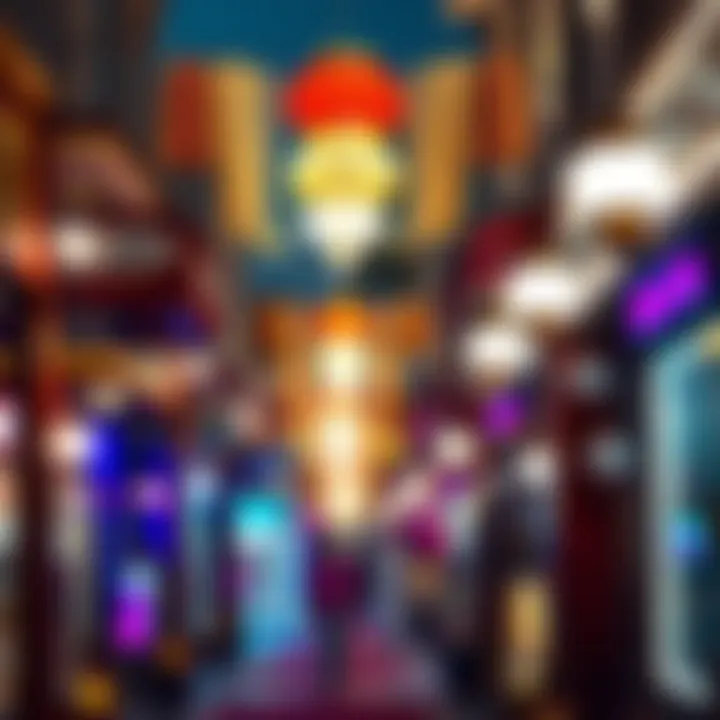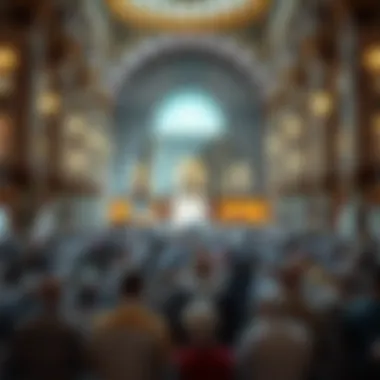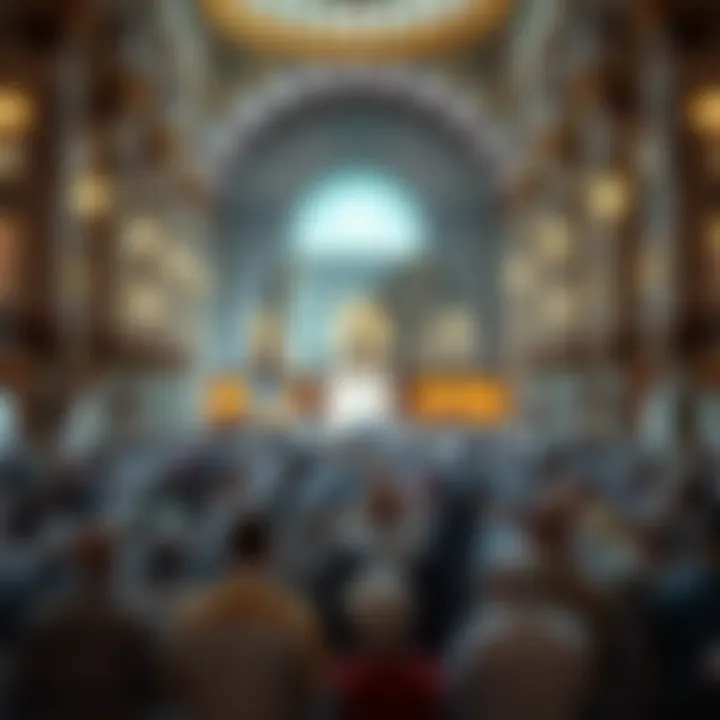Ramadan Timetable in UAE: Cultural and Real Estate Insights


Intro
Ramadan is not just a month of fasting; it serves as a significant period of reflection and spiritual growth for Muslims around the world. In the UAE, this holy month takes on a distinct flavor, intertwining daily routines with cultural practices that resonate deeply in the fabric of society. The Ramadan timetable, outlining prayer times and fasting schedules, becomes central to life during these 29 to 30 days. This article peers into the nuances of this timetable and its broader implications.
Understanding the Ramadan timetable is essential not only for the faithful but also for non-Muslims and stakeholders in various sectors, especially real estate. The ebb and flow of daily activities shift dramatically, affecting everything from work hours to social gatherings. Businesses adapt to accommodate changes in clientele while still observing the traditions that enrich the community.
A deeper dive into the Ramadan timetable reveals varied dimensions—ranging from how communities come together during Iftar, the breaking of fast, to the likely ripple effects on real estate and market dynamics in Dubai. Investors, homebuyers, and property managers alike are keen to decipher how these shifts influence the Malta space and what opportunities might arise during this transformative period.
As we navigate through each aspect of the Ramadan experience in the UAE, our discussion will illuminate key trends, cultural engagements, and future predictions in the real estate market, providing readers with insights tailored especially for those involved in Dubai's housing landscape.
In this context, we will explore the following topics:
- Market Insights
- Investment Strategies
- The Cultural Impact of Ramadan
- Community Engagement During the Month
We aim to provide a comprehensive view that moves beyond mere observance of traditions, delving into themes of community, culture, and commerce.
Understanding Ramadan
The observance of Ramadan is deeply woven into the fabric of Muslim culture, especially in the UAE. Understanding Ramadan provides crucial insights into how this holy month shapes not only spiritual practices but also the broader societal rhythms. For investors, homebuyers, and property managers, recognizing the significance of Ramadan goes beyond just a calendar mark; it's about grasping how it affects everything from community engagement to real estate trends.
By demystifying Ramadan, readers can appreciate its profound impact, which extends beyond fasting to encompass a time of reflection, compassion, and unity. It encourages individuals to strengthen their ties to community and family, transforming daily routines and elevating communal values.
Historical Context
Ramadan has its roots in a rich historical backdrop that is crucial for comprehending its significance. The month commemorates the revelation of the Qur'an to the Prophet Muhammad, which is a pivotal event in Islamic history. This revelation occurred over 1,400 years ago and has since laid the foundation for the practices observed today.
In the UAE, like in many Muslim-majority countries, the cultural and religious practices surrounding Ramadan have developed over centuries, influenced by Bedouin traditions, trade interactions, and historical migrations. The local customs of hospitality and community during this month mirror the country's history, where riyadah, or communal solidarity, has always been a key virtue.
Historically, the spirit of Ramadan has been about more than personal piety; it's a time to share blessings and connect, amidst the challenges each community faces. This context gives us a better grasp of current practices and attitudes.
Cultural Significance
The cultural ramifications of Ramadan in the UAE are immense, creating a rich tapestry of traditions that offer unique experiences. This month transforms social dynamics, as familial ties and community relationships are reinforced. Souks and markets come alive with special foods and gatherings, while social media buzzes with posts celebrating the spirit of Ramadan.
Here are some notable cultural aspects:
- Iftar and Suhoor: These meals, breaking the fast and pre-dawn rituals, respectively, are not just about food; they symbolize togetherness and sharing. Many restaurants craft lavish buffet spreads to cater to families and communities, enhancing the sense of belonging.
- Charity and Generosity: Ramadan emphasizes charitable acts, with many individuals engaging in philanthropy. This has a ripple effect on local businesses and initiatives focused on giving back, which flourishes during this time.
- Art and Heritage: Cultural events, exhibitions, and literature thrive during the month. Artists often draw inspiration from the spiritual themes of Ramadan, showcasing local talent and enhancing cultural appreciation among residents and visitors.
Understanding these cultural layers not only enriches our grasp of Ramadan but also offers investors and homebuyers key insights into seasonal trends that could influence their decisions.
The Ramadan Timetable Explained
The Ramadan timetable holds considerable weight in the daily rhythms of life throughout the holy month in the UAE. This timetable isn't simply a listing of when to eat or pray; it serves as a guide for the Muslim community, shaping interactions, work schedules, and social gatherings. Understanding the structure and importance of this timetable allows stakeholders—from investors to lifestyle enthusiasts—to appreciate the cultural fabric of Ramadan and how it influences various sectors, including real estate.
Components of the Timetable
A typical Ramadan timetable consists of various components, intricately woven into the lives of those observing the fast. The main elements include:
- Suhoor Timing: The pre-dawn meal, which plays a crucial role in preparing individuals for the day of fasting ahead.
- Fajr Prayer Time: Marks the beginning of the fast. This prayer time is significant as it signals the start of abstaining from food and drink until sunset.
- Iftar Timing: The meal to break the fast, usually just after the Maghrib prayer. This is a communal event for many, providing a sense of togetherness.
- Taraweeh Prayers: Optional night prayers performed during Ramadan, which help in deepening the spiritual experience.
Each of these components is carefully calculated, usually based on astronomical data, to ensure accuracy. This precision reflects the blend of spiritual significance and practicality that defines Ramadan in the UAE.
Calculation of Prayer Times
Calculating prayer times during Ramadan is a meticulous process, often requiring local astronomical knowledge. Traditionally, this is done through sifting through historical records and applying mathematical formulas based on the moon's phases and position relative to the Earth. In the UAE, local institutions frequently publish these times to ensure the community remains in sync.
Factors influencing the calculation include:
- Geographical Location: The latitude and longitude of the UAE play a significant role. As different places have varying daylight hours, prayer times must adjust accordingly.
- Time of Year: Ramadan shifts approximately 10 days each year, affecting the prayer timings.
- Sunrise and Sunset: The timings for Fajr and Maghrib prayers are directly tied to these natural phenomena.
For example, during late March or early April, Fajr might be around 4:30 AM and Maghrib approximately at 6:30 PM.


The accurate calculation of prayer times is not merely a guideline; it shapes the entire experience of Ramadan for many, integrating faith and daily life seamlessly.
This system facilitates a structured observance, allowing adherents to plan their days effectively while respecting the spiritual essence of the month. For investors and developers in the UAE, understanding these details can translate into better service offerings, from scheduling community events to developing properties that accommodate the unique needs of residents during this sacred time.
Fasting and Its Importance
Fasting during Ramadan holds a particular significance that transcends mere abstinence from food and drink. It embodies deeply rooted traditions and beliefs, fostering a bond among communities that is hard to find elsewhere. The essence of fasting is entwined with both physiological and spiritual dimensions, contributing to a holistic transformation that many seek each year.
Physiological Effects of Fasting
On a physiological level, fasting acts as a reset button for the body. The stomach gets a chance to recover from constant digestion, allowing it to function more efficiently once the fasting period ends. Many people find that their energy levels shift dramatically after a few days into Ramadan, allowing them to tap into hidden reservoirs of stamina.
Moreover, scientific studies have shown that fasting may lead to various health benefits, such as improved blood sugar control, enhanced fat metabolism, and even stronger immune function. Fasting can stimulate processes like autophagy, where the body cleans out damaged cells and regenerates new, healthy ones. This biological aspect can lead individuals to become more consciously aware of their dietary choices, often resulting in healthier eating patterns post-Ramadan.
It's also important to keep hydration in mind for those observing the fast. Replenishing fluids after sunset can help mitigate dehydration, especially in the hot climate of the UAE. Many people in Dubai find that their dietary habits transform, and meals become more balanced as they navigate this unique lifestyle shift. Informing oneself about the right foods, like dates and fluids rich in nutrients, is essential here.
Spiritual Reflections During Fasting
Fasting serves as a vessel for spiritual reflection and growth. In the hustle and bustle of daily life, individuals often neglect to pause and reflect. During Ramadan, however, there’s a deliberate shift in focus: less on the material and more on spiritual nourishment.
Days filled with fasting culminate in nights dedicated to prayer, reflection, and community ties. Engaging in prayer and recitation of the Quran during this sacred month leads many to a place of deeper understanding and introspection. The act of abstaining from worldly pleasures encourages adherents to foster a sense of appreciation for what they have.
Beyond personal reflection, fasting draws communities together, igniting conversations and connections that might otherwise be missed. Sharing iftar meals breaks barriers and builds bridges of understanding among diverse groups. These communal aspects elevate the entire experience, transforming it into a collective journey.
“Ramadan is a time to purify the soul, refocus attention on God, and practice self-discipline and sacrifice.”
Ultimately, the fasting experience during Ramadan is multifaceted, lightly layering physical health benefits over deep spiritual meaning, cementing its status as a pivotal aspect of life in the UAE. By engaging with both the body and spirit, individuals emerge from Ramadan with a renewed sense of purpose and community, leaving a lasting imprint on their lives throughout the year.
Providing a harmonious blend of personal growth, social cohesion, and mindful eating, the significance of fasting cannot be overstated. It becomes more than just an observance; it turns into a transformative experience that ripples through individual lives and extends to the larger community in profound ways.
Community Engagement in Ramadan
Community engagement during Ramadan is more than just a social activity; it embodies the spirit of the holy month. In the United Arab Emirates, this time creates opportunities for deep connections, collective experiences, and shared values. As families and friends come together for breaking fast, the fabric of the community strengthens. The act of coming together enhances bonds across cultural and social divides, proving that even in a bustling modern city like Dubai, a sense of unity persists.
Iftar and Suhoor Gatherings
Iftar and Suhoor have become central to social life during Ramadan in the UAE.
Iftar is the meal to break the fast at sunset, commonly a cherished time for families and friends to gather. Restaurants and hotels often prepare lavish buffets, making it a culinary experience. This gathering is not just about food; it's a point of connection among diverse communities. You often see expatriates and locals sharing tables, illustrating the cosmopolitan essence of UAE.
Suhoor, the pre-dawn meal before the day of fasting, is equally important. Many people opt to gather with their loved ones, whether at home or in restaurants, creating an environment of warmth and cooperation in the early hours. This early morning meal often includes sweet and savory dishes. Some traditional dishes might be highly sought after: fatayer, lentil soup, and kuntakinte, to name a few. Such meals become opportunities to discuss life plans and aspirations, making Suhoor a time of reflection and camaraderie.
Various public events, like Iftar tents set up by municipalities or charitable organizations, foster inclusivity. Community members of all backgrounds share in this experience, further cultivating ties that bind society, making Ramadan not just a personal commitment but a communal one.
Charitable Acts and Initiatives
Ramadan is also the season for giving, and charitable acts are at the forefront. Many organizations prioritize initiatives aimed at supporting the less fortunate. The act of donating is not just encouraged; it's embraced as part of one's faith practice.
Across Dubai, you may witness volunteers setting up food drives, distributing meals to those in need, or organizing clothing donations. These initiatives often see remarkable community support. In neighborhoods, you might find various local leaders spearheading programs designed to provide meals to less fortunate families, demonstrating a collective responsibility to uphold Ramadan's spirit of generosity.
Many businesses and institutions offer matching donations during Ramadan, amplifying the impact of individual contributions.
"Giving in Ramadan is a heartfelt expression of the teachings embedded in our traditions. It reaches beyond mere obligation; it's about enriching our human experience together."
This time fosters a sense of solidarity, breaking down barriers, and engaging communities in constructive dialogue that transcends temporary circumstances. As the UAE witnesses these acts of charity, the scene becomes a powerful reminder of the collective human experience, where one person's loss becomes another person's lesson in compassion.
Closure
In summary, community engagement during Ramadan in the UAE encapsulates the essence of the month. Iftar and Suhoor gatherings help build connections among people from various backgrounds, while charitable acts ignite a spirit of generosity that underscores the cultural significance of this holy period. Through these interactions, the community thrives, growing in both strength and purpose, aligning with the values that Ramadan inspires.


The Impact of Ramadan on Daily Life
The holy month of Ramadan casts a significant influence on the daily routines of those residing in the United Arab Emirates. It is not just a period of fasting; it is a time that reshapes social structures, work timings, and cultural practices. For investors, homebuyers, and property managers, understanding these changes becomes paramount, as they can directly influence market trends and community dynamics. The very essence of this month fosters a spirit of unity and reflection, interweaving its fabric into the daily life of the populace.
Changes in Work Schedules
During Ramadan, the typical work schedule undergoes a remarkable shift. Many businesses adjust their hours, often commencing later in the morning and concluding earlier in the evening. This change allows employees to partake in the daily fasts without the strain of a full workday. For instance, a common practice sees the working day start around 10 AM and end before 3 PM. This can create a somewhat erratic work environment, as businesses strive to balance productivity with the varied needs of their employees who observe fasting.
Apart from private companies, government institutions also modify their timings, often closing significantly earlier to allow their staff to prepare for iftar, the meal that breaks the fast. As an investor or a property manager, being aware of this adjusted schedule can help in planning property viewings or client meetings more effectively, ensuring that appointments are coordinated with this change.
"Adjusting to Ramadan working hours can enhance productivity, but it also encourages a more community-focused atmosphere where relationships build and flourish over shared meals."
Social Norms and Etiquette
Ramadan brings about a rich tapestry of social customs and mutual respect that shapes interpersonal interactions across the UAE. It’s essential to navigate these changed norms with care. For many, abstaining from eating or drinking in public during daylight hours is a mark of respect for those fasting. Visitors and expatriates in the UAE are encouraged to adhere to this etiquette, emphasizing understanding and cooperation.
Social norms take on a celebratory tone in the evenings. The tradition of iftar becomes more than just breaking the fast; it’s about gathering with family, friends, and neighbors. It’s common for people to open their homes to one another, sharing not just food but also laughter and companionship. This hospitality draws communities closer, enhancing social bonds during the month.
Beyond just personal interactions, the etiquette during Ramadan extends into business dealings and public spaces. Investors and property managers should consider these elements when navigating negotiations or community engagements. Acknowledging the significance of this sacred time can foster goodwill and respect, ultimately establishing a more advantageous relationship for all parties involved.
Real Estate Trends During Ramadan
During the month of Ramadan, the real estate market in the UAE experiences notable fluctuations influenced by various cultural and social dynamics. This period is not merely about spiritual reflection but also embodies unique trends that affect both property investment and living requirements. Understanding these fluctuations can provide investors, homebuyers, and property managers with a roadmap to navigate the market effectively.
Market Fluctuations
The rhythm of life in the UAE changes significantly during Ramadan, impacting various sectors, especially real estate. Properties in high-demand areas tend to see a shift in occupancy rates, as many families prefer to either relocate temporarily to be closer to their places of worship or seek homes that facilitate their communal activities. Here are some key points reflecting these fluctuations:
- Rental Prices Adjustments: With many expatriates returning to their home countries for Ramadan, rental prices may soften in certain hubs. This could present opportunities for existing tenants to renegotiate their leases.
- Supply and Demand Dynamics: The demand for short-term lets spikes, particularly in tourist-heavy areas. Properties geared towards travelers, such as apartments and villas, become prime rental options.
- Investor Behavior: Investors tend to adopt a more cautious approach during Ramadan due to the adjustments in cash flow and spending patterns. There’s often a significant focus on properties that offer high returns post-Ramadan, especially around Eid festivities.
"Understanding the local cultural practices during Ramadan can be a game changer for real estate strategies."
Investment Opportunities
Ramadan opens up a variety of investment opportunities that savvy investors can leverage. It’s a season that encourages not only spiritual growth but can lead to financial growth as well. Here are some beneficial insights regarding potential investment avenues during this sacred month:
- Commercial Properties: The demand for commercial spaces that cater to iftar gatherings and other community events can surge. Investors might consider properties that have potential for transformation into dynamic event spaces.
- Residential Developments: Properties close to mosques or community centers tend to attract families seeking convenience. Developers can tap into this segment by creating units that foster community spirit and enhance the living experience.
- Aligning with Seasonal Trends: As Ramadan often sees an increased interest in charitable activities, properties that can house community events or non-profit initiatives can be a unique selling point.
By observing these trends, stakeholders can position themselves strategically to meet the evolving needs of the market. The Ramadan period is not only a time of fasting but also a ripe interval for potential wealth creation through informed real estate investments.
Lifestyle Adaptations in Ramadan
Ramadan presents a unique opportunity for individuals and families in the UAE to make adjustments that impact their daily routines in meaningful ways. These lifestyle adaptations extend beyond spiritual growth and fasting; they touch on culinary changes, home environments, and social practices. Understanding these modifications can shed light on the collective experience during this holy month and provide valuable insights into how communities navigate this sacred time.
Culinary Trends and Preferences
During Ramadan, culinary habits evolve significantly. The month is characterized by a rich tapestry of traditional foods that often come alive at iftar—the meal to break the fast at sunset.
One might notice an inspiring shift towards dishes that emphasize both nutrition and shared experiences. Popular choices include dates, which hold great significance, and staples like lentil soup and flavorful biryanis. It's not unusual to find families spending hours in the kitchen, preparing elaborate meals to serve loved ones and neighbors. Additionally, many prepare themed gfts of food, creating a sense of kinship.
This time of year also inspires eateries to test their creativity. New menu items and promotional offerings appear in various restaurants, catering to the tastes of those sharing the evening meals.
"Food brings people together, especially during Ramadan. It's not just about sustenance but about sharing and connection."
Dietary preferences might shift towards lighter meals at suhoor, the pre-dawn breakfast that fuels the day’s fast. Items such as oatmeal, yogurt, and fruits become popular choices. They help in sustaining energy and hydration while focusing on nutritional value. Urban legends about new dietary fads around Ramadan emerge but often, it’s the family recipes and traditional dishes that dominate.
Home Decoration and Atmosphere
Decorating homes during Ramadan reflects the spirit of the month and is a beautiful sight that draws people together. Homes transform with a special atmosphere, as individuals partake in decorative customs that are often handed down through generations.


Lighting plays a crucial role, with many opting for soft glows through lanterns and string lights, crafting a warm and inviting ambiance. Colors such as blue, green, and gold are commonly used, mirroring both elegance and spirituality.
Families might adorn their living spaces with traditional motifs, creating a blend of comfort and festivity. The diwan, a space for social gatherings, becomes the heart of the home as families come together to share meals and prayers.
Setting the table is almost an art form in itself; elaborately decorated displays featuring dates, juices, and an array of delicacies are customarily prepared. This sense of preparation resonates deeply within communities; homes serve as venues for iftar, sparking reciprocal hospitality among families and friends. Such gatherings foster community and togetherness, reinforcing social bonds during Ramadan.
In summary, the adaptations in lifestyle during Ramadan highlight a beautiful interplay between spirituality and community living. Engaging in new culinary trends and decorating homes create an atmosphere that not only honors the essence of the holy month but also brings people closer together.
Reflections on Ramadan
The reflections during Ramadan offer a unique opportunity for self-examination, growth, and greater communal bonds. This period is more than just abstaining from food and drink; it serves as a gateway for many to reassess priorities and engage deeply with their communities. The essence of Ramadan lies not just in observing rituals, but in grasping the undercurrents that drive personal and collective development.
Personal Growth and Community Cohesion
In the bustling heart of the UAE, Ramadan becomes a catalyst for personal growth, fostering an environment where introspection and compassion thrive. As individuals fast, they often turn inward, contemplating their actions, thoughts, and future intentions. This period encourages a sort of honesty with oneself that isn’t always easy to confront. Many feel empowered to shed bad habits, work towards self-improvement, and cultivate a greater appreciation for what they have.
The communal aspect can’t be overlooked either. In homes and mosques across the UAE, families and friends gather to break their fasts. These meals become manifestations of unity, where diverse stories and backgrounds mesh over shared plates. This act cultivates not just a sense of belonging but strengthens your ties with those around you.
“Ramadan unites people in a shared journey of empathy and reflection, which often transcends beyond traditions and rituals.”
To illustrate the impact of Ramadan on community cohesion, consider the following examples:
- Iftar gatherings foster connections among neighbors who may not interact as often outside this period.
- Charities and local initiatives increase during Ramadan, encouraging individuals to give and partake in collective efforts aimed at helping those in need.
- Enhanced communal prayers in mosques create a sense of shared purpose and collective identity.
Through these interactions, individuals often discover they are not alone in their struggles and aspirations, leading to enhanced social ties. Fostering community and personal growth is essential during Ramadan as it provides a rare space for collective healing and understanding.
Preparations for Eid
As Ramadan draws to a close, the anticipation for Eid al-Fitr grows palpably. This festive occasion represents both an end and a new beginning, as people reflect on their experiences during the holy month. Preparations for Eid are significant, involving both personal and communal endeavors. Traditionally, families clean their homes, buy new clothes, and prepare special dishes to celebrate. It’s an occasion marked by generosity, showcasing gratitude for the blessings received during Ramadan.
To prepare effectively:
- Shopping for Eid clothes: Families often indulge in new outfits, a cherished custom that symbolizes renewal.
- Planning meals: Featured dishes can vary, but dates and sweets often grace the table, reminiscent of the month just passed.
- Charity: Many make it a point to give Zakat al-Fitr, ensuring that everyone can participate in the joyful festivities, fostering the principle of giving back.
In the UAE, it's common to witness the highways flooded with shoppers preparing for the celebrations, and markets full of vibrant decorations. The hustle and bustle of preparations mark a shift, where the quietude of fasting transitions to jubilant festivity.
In sum, the reflections during Ramadan serve as fertile ground for personal growth and community cohesion. The insights gathered during the month guide individuals into Eid and beyond, reminding them of the importance of gratitude, unity, and continued self-development.
Culmination
In examining the Ramadan timetable, we gain insights that reach far beyond mere prayer times. The significance of this topic cannot be overstated; it is not just about the schedule but how it intricately weaves into the very fabric of daily life in the UAE. The Ramadan timetable serves multiple roles: it acts as a guide for personal reflection, communal harmony, and even market dynamics.
Understanding the timetable can lead to several benefits for a diverse array of stakeholders. For investors and property managers, recognizing how Ramadan influences market trends can shape better investment decisions. The realization that many residents engage deeply with their communities during this month transforms how to approach business strategies, social interactions, and event planning.
Moreover, the timetable instills a sense of discipline and routine that is often harder to maintain outside this holy month. It reminds us of the importance of time management, particularly during the fasting hours, when the focus shifts from productivity to spiritual enrichment. This dual benefit—balancing obligations and belief—creates a unique opportunity for growth, both personally and professionally.
The Ramadan timetable serves as a bridge connecting individual practices to broader societal values, encouraging us to reflect on how our actions contribute to community welfare during this sacred period. By integrating both the spiritual and the practical, this timetable enriches lives and fosters a sense of belonging.
"In Ramadan, the clock slows down just enough for us to contemplate life differently."
Summary of Key Insights
As we culminate our exploration, a few key insights emerge:
- Cultural Weight: The Ramadan timetable is a vital cultural guide facilitating spiritual engagement.
- Community Action: Extended prayer times bring communities together through collective Iftar and Suhoor meals.
- Market Impact: Real estate trends during Ramadan shift, inviting cautious optimism from investors.
- Personal Growth: Fasting positively influences personal discipline, affecting social interactions and daily habits.
These insights paint a nuanced picture of Ramadan, shedding light on both its personal and communal impacts.
Looking Ahead Post-Ramadan
The end of Ramadan is often viewed as a farewell to a month of reflection, yet it carries potential for new beginnings. The insights gained during this period can leave lasting impressions that extend well beyond the holy month.
Many individuals and communities harness the lessons learned from Ramadan to foster continuous growth. This is particularly notable as people transition back to their usual routines, often embracing a balance between spiritual awareness and practical engagement. Financial investors might find themselves reevaluating their strategies, capitalizing on trends identified during Ramadan.
Additionally, the remnants of community spirit cultivated during this month often linger for residents. People maintain connections that develop through shared experiences, which can influence local events, charity drives, and even property investments.
For property managers and homeowners, post-Ramadan presents opportunities to reassess the landscape. Increased demand for living spaces that accommodate communal activities, such as multi-family residences, may arise. Emphasizing adaptability and awareness of community needs can create strategies that capitalize on this evolving market.













